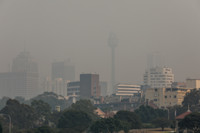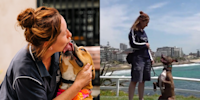NSW Police Force
For all emergencies call triple zero (000). If your matter is not an emergency, call 131 444 or contact your local police station.
While Sydney is a safe place to live, work and play, we have a responsibility to increase and enhance community health and safety.
For all emergencies call triple zero (000). If your matter is not an emergency, call 131 444 or contact your local police station.
Whether you live or work in our area, it’s important to us that you feel safe at all times.
We know that good preparation and well-implemented strategies can not only improve the quality of life of our residents but also save lives.
Sydney enjoys a reputation as one of the safest and most liveable cities in the world. From time to time, there can be emergencies in the city requiring a significant coordinated response from emergency services and other government agencies such as health and transport.
Severe storms with strong winds and lightning strikes, heavy rainfall and flash flooding, and extreme heat during a heatwave are the most likely emergency and disaster impacts for our residents, workers and visitors.
Other impacts could include health emergencies such as a major influenza outbreak causing service disruptions in the local area.
It's our priority to do everything in our power to ensure that our communities have access to help when needed and feel safe at home and work.

The Sydney and North Sydney CBD evacuation plan was developed by emergency service agencies and government including NSW Police Force, Fire and Rescue NSW, NSW Ambulance, NSW State Emergency Service, Transport for NSW, City of Sydney and North Sydney councils.
You can help effectively manage evacuations in the city by:
NSW Reconstruction Authority provides information for individuals, councils, community service organisations and businesses to become disaster ready through its Get Ready NSW initiative.
To manage a coordinated response, we've worked with emergency service agencies in the local area to develop the local emergency management plan. The plan describes the arrangements to prepare for, respond to, and recover from emergencies.
Building and business owners and managers should develop an emergency management plan suited to their local environment.
You can help effectively manage emergency events in the city:
Our emergency preparation guides will provide you with some simple steps you can take to prepare for these emergencies or potential disasters. There are many sources of information to help you before, during and after an emergency or disaster.












We work on crime prevention campaigns and initiatives with NSW Police and other organisations to help reduce the already-low crime rates in Sydney.
Crimes against the person such as assault and robbery are unavoidable in large cities but we work hard to counter street crime and violence. Our community safety action plan sets out our contribution to making Sydney a safe and resilient place to live, visit, work and study.

Guides
The NSW Government, on behalf of all local councils, has commissioned not-for-profit organisation GIVIT to coordinate the donation of goods and services in bushfire-affected communities.
While affected communities are grateful for the donations of food and supplies, they request these are no longer provided directly. There simply aren't enough resources to manage and distribute donated goods as efforts are focused on rebuilding local communities.
GIVIT captures public and corporate pledges of assistance online and helps to coordinate and manage donations to those in need.
The organisation works with local councils, charities and community groups to match a donation to a recipient in need.
This ensures those in need get exactly what they need when they need it most. It also eliminates the need for storage and sorting of donations and potential disposal of unwanted goods.
Money received by GIVIT is used to buy essential items from local businesses to help economic recovery

News
A sense of wonder: 3 older people share their wisdom
News
Why Sydney's heat feels more intense
News
Join the Lord Mayor’s official welcome event for international students
News
Breathe easy: tips for navigating poor air quality
News
From diagnosis to advocacy in raising breast cancer awareness
News
Share your views on volunteering
News
Be asbestos ready: 1 in 3 homes contains asbestos
News
Our Young Professionals Network shares their 8 tips for good mental health
News
Heart dogs: Our companion animals officer shares her great love and loss of rescue animals
News
Help shape our new inclusion (disability) action plan